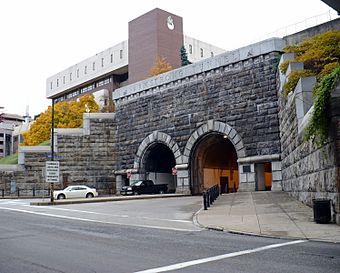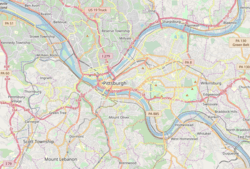Armstrong Tunnel facts for kids
|
Armstrong Tunnel
|
|

The Armstrong Tunnel at Forbes Avenue. Duquesne University's Gumberg Library is visible in the background
|
|
| Location | Between Forbes and Second Aves. at S. Tenth St., Pittsburgh, Pennsylvania. |
|---|---|
| Built | 1926 |
| Architect | Covell, Vernon R.; Et al. |
| NRHP reference No. | 86000015 |
Quick facts for kids Significant dates |
|
| Added to NRHP | January 7, 1986 |
The Armstrong Tunnel is a cool underground pathway in Pittsburgh, Pennsylvania. It helps people travel easily between different parts of the city.
This tunnel connects Second Avenue, near the South Tenth Street Bridge, to Forbes Avenue. It goes right under a big hill called the Bluff, where Duquesne University is located. Think of it as a shortcut through the city!
Contents
Building the Tunnel
When It Was Built
The Armstrong Tunnel was built a long time ago, between 1926 and 1927. That's almost 100 years ago! It took a lot of hard work to dig and construct this important passage.
Who Designed It
A smart engineer named Vernon R. Covell was in charge of building the tunnel. He worked for the Public Works Department of Allegheny County.
The fancy entrances to the tunnel, called "portals," were designed by a city architect named Stanley L. Roush. He also designed other famous Pittsburgh landmarks, like the entrances to the Smithfield Street Bridge and the Pittsburgh City-County Building.
What Makes It Special
Tunnel Design
The Armstrong Tunnel has two separate paths, like two big tubes side-by-side. They are shaped like a horseshoe inside. Interestingly, the tunnel isn't perfectly straight; it bends a little halfway through.
There's also a special walkway on the western side just for people walking.
Easy Travel for Bikes
If you're a bicyclist, you might find one direction of the tunnel super easy to ride through! The air inside the tunnel naturally flows towards the river. This means if you're riding in that direction, the wind helps push you along, so you don't have to pedal as hard.
Cell Phone Service Underground
Even though it's a tunnel, you can still use your cell phone inside! Since August 1987, the Armstrong Tunnel has had cell phone reception. This is pretty neat for an old tunnel!
Why It's Called Armstrong Tunnel
The tunnel is named after a very important person: Joseph G. Armstrong. He was the County Director of Public Works.
Mr. Armstrong also served as the Mayor of Pittsburgh and an Allegheny County Commissioner. Many of Pittsburgh's bridges were replaced during the years he was in charge, between 1910 and 1940. Naming the tunnel after him was a way to honor his contributions to the city.
 | Sharif Bey |
 | Hale Woodruff |
 | Richmond Barthé |
 | Purvis Young |




